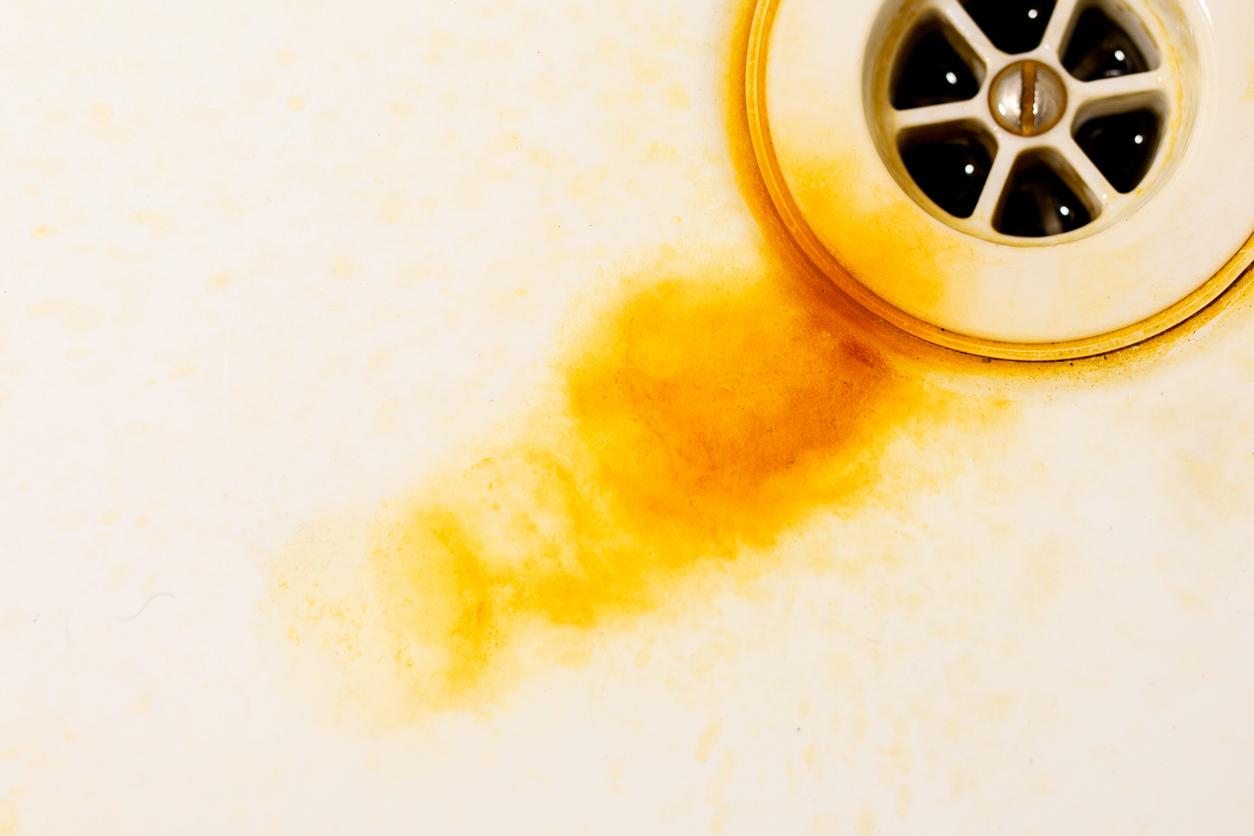If you’ve noticed chalky residue on your dishes, a bad smell from your faucet, or orange-brown stains in your sinks, you’re likely dealing with water quality issues. There are many common water contaminants that affect Michigan homes. Hard water, smelly water, and rusty water are some of the most prevalent issues that occur as a result.
These problems aren’t just annoying— they can damage appliances, plumbing fixtures, laundry, and make your water unpleasant to use.
As Southeastern Michigan’s water treatment experts for over 40 years, we’ve helped countless people solve household water problems. In this blog, we’ll explain what causes these types of issues and share proven solutions to fix them. At Advanced Water Treatment, we’re here to make sure you get to enjoy clean, fresh water every day.
Contaminants in Your Water Source
Most homes in Michigan have hard water to some degree, whether you live in a home with a well or use public water. Both of these water supplies can have water quality issues. However, wells are more prone to drastic changes.
The water chemistry from a private well supply can vary significantly throughout the year due to changing environmental conditions. Seasonal changes, including heavy rains, spring runoff from winter snows, and drought periods all affect your well water’s chemistry.
Shallow wells are particularly vulnerable to these changing conditions. However, all wells experience fluctuating water quality as the environment impacts the water table.
Changes can lead to higher levels of rust in well water, causing discoloration and potential plumbing issues. This can be due to high acidity or iron content. Additionally, environmental shifts can result in bacteria issues, which can lead to smelly well water. The rise of hydrogen sulfide gas due to sulfur-reducing bacteria in the water is one example.
Other common changes include increased manganese and hard water minerals, such as calcium and magnesium.
Because of natural water cycles, experts recommend testing your private well water every year to monitor it. Regular testing helps identify new problems that may require water treatment solutions. It’s especially important to test for different types of bacteria and chemicals, which can affect private wells through various sources.
Poor water conditions can lead to several noticeable problems in your home, from stained fixtures to unpleasant odors. Let’s examine the specific side effects of these water issues.
High Levels of Iron, Hard Minerals, & Odor-Causing Bacteria: Side Effects
Living with problematic water can impact nearly every aspect of your home life.
High iron content, iron bacteria, or acidic water that damages plumbing can lead to rust in water. Old pipes and municipal water line disturbances can also contribute to rust-colored water.
When rusty water flows through your pipes, it leaves behind telltale orange-brown stains on sinks, toilets, and bathtubs. These iron deposits can also discolor your laundry, turning white clothes dingy and causing permanent stains. Over time, rust buildup can clog pipes and reduce water pressure throughout your home.
Hard water creates its own set of challenges. The high mineral content leaves white limescale deposits on fixtures, while soap struggles to lather properly in hard water. This means you’ll need more detergent to clean clothes, which often come out feeling stiff and looking dull.
Your water-using appliances suffer, too. Water heaters, dishwashers, and washing machines can develop scale buildup that reduces their efficiency and shortens their lifespan. You might notice dry skin after showering, spotty glassware, and higher energy bills as your appliances work harder to function.
Bad odors in water can range from musty to the common rotten egg smell linked to hydrogen sulfide. Beyond making water unpleasant to drink, these odors can spread throughout your home, affecting the taste of cooked food and making showers uncomfortable. Some homeowners even report that the smell lingers on clean laundry and dishes.
Without proper treatment, these water quality issues won’t resolve on their own. In fact, they can worsen over time as minerals and bacteria continue to accumulate in your plumbing system. This is why addressing water issues quickly is so important for protecting your home and well-being.
Treatment Options for Common Water Problems
Having clean, fresh-smelling water is possible with the right treatment system.
For hard water treatment, a water softener is your best choice. This type of system removes the minerals that cause scaling and soap scum. It works by replacing minerals like calcium and magnesium with sodium, giving you softer water that’s gentler on your skin, clothes, and appliances. Your soap will lather better, and you’ll see fewer spots on dishes and fixtures.
When rust is your main concern, an iron filter can help. These filters are specially designed to remove iron and manganese from your water supply. Once installed, you’ll see no more staining on sinks and toilets, and your clothing will stay brighter after washing. Iron filters can even help remove the metallic taste that often comes with rusty water.
If rust is due to acidity, there are treatment options available that can raise the water’s pH and protect your pipes.
If you’re dealing with unpleasant smells, a unique filtration system is what you need. These units can target and remove:
- Hydrogen sulfide (the gas that causes rotten egg odor)
- Chlorine
- Metals that cause a metallic scent
- Organic compounds that cause musty/earthy smells
- Fishy odors caused by metals like barium and cadmium
- And more
After treatment, your water should smell fresh and clean, making everything from showering to cooking more pleasant.
For homes with multiple water issues, we often recommend a combination of these systems. At Advanced Water Treatment, we start by testing your water to understand exactly what’s causing the issue. This helps us recommend the right solution for your specific situation.
Contact Our Water Quality Professionals
Clean, great-tasting water isn’t out of reach. Whether you’re dealing with hard water stains, rust, or bad odors, our team of water treatment experts can help.
Unfortunately, iron and mineral deposits aren’t the only water issues Michigan residents face. There have been many reports of PFAS, lead, and other pollutants found in drinking water. That’s why Advanced Water Treatment focuses on providing proven solutions for homes across Livingston, Oakland, and Washtenaw counties.
Our team has served Southeastern Michigan for over 40 years. Contact us today for an in-home hard water test and comprehensive analysis.



